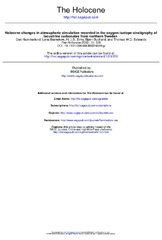Holocene changes in atmospheric circulation recorded in the oxygen-isotope stratigraphy of lacustrine carbonates from northern Sweden
Peer reviewed, Journal article
Permanent lenke
https://hdl.handle.net/1956/2501Utgivelsesdato
2002Metadata
Vis full innførselSamlinger
Originalversjon
https://doi.org/10.1191/0959683602hl548rpSammendrag
The oxygen-isotope composition of local precipitation (d18OP) is reconstructed from carbonate lake-sediment components in a sediment core covering the last 10000 calendar years from Lake Tibetanus, a small, hydrologically open, groundwater-fed lake in the Abisko area, northern Sweden. Comparison of the d18OP history with a pollen-based palaeotemperature record from the same core clearly reveals pronounced deviations from the normally expected temporal d18OP-temperature relation (so-called ‘Dansgaard relation’) that may be a function of changing oceanicity. The transition from relatively moist, maritime conditions in the early Holo cene to a much drier climate after 6500 cal. BP is re‘ ected by major changes in forest extent and composition as recorded by pollen and plant macrofossil data. At the time of maximum in‘ uence of westerly air-mass circulation (high zonal index) c. 9500 cal. BP, brought about by high summer insolation and enhanced meridi onal pressure gradients, d18OP at Lake Tibetanus was about 2 higher than would be predicted by the modern isotope-temperature relation. The occurrence of long-term changes in d18OP-temperature relations, which are more sensitive measures of palaeoclimate than either d18OP or temperature alone, needs to be taken into account when extracting palaeoclimatic information from continental oxygen-isotope records.
